After twenty-nine years of teaching creative writing at Cornell University, I have found that the following metaphor for writing a novel is the one I have fallen back on most often. Say you are in Cincinnati, Ohio (where I once lived) and want to go by river to Louisville, Kentucky, approximately one hundred miles downstream. You know where you want to go, that is, you have an ending for your novel in mind, but you have never been on the river before. A glance at a map will tell you the names of the major tributaries between the two cities and the larger towns located on the banks (that is, the novel's main events and characters), but you do not know the river's currents, its snags, its smaller islands, its minor tributaries, and any number of other pertinent factors. You don't know the thrill of catching a swift current or the drudgery of day to day paddling (you are self-, not motor-propelled). You know the river will take you to Louisville if you navigate its currents successfully and if you don't give up after days and weeks of dispiriting monotony. (The Israeli novelist, Amos Oz, said writing a novel is like opening a small store every morning at 9 a.m. If a customer comes in, you're there to attend to him. If one doesn't, at least you've been on the job. At two o'clock you close up shop.) If you do get to Louisville, of course, it may be Louisville in name only and bear little resemblance to the city you have carried around for so long in your head. But at least you're somewhere, you can be said to have arrived. At which point, a second trip down a now more familiar river, that is the revision, can begin.
THE RIO LOJA RINGMASTER
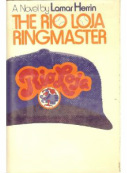
The Rio Loja Ringmaster began with a baseball game a friend and I attended at the old Crosley Field in Cincinnati, Ohio. We sat beside one of the bullpens and watched the nervous antics of the relief pitchers more than we did the game. Relief pitchers seemed a special breed, skating out on a fine line of sanity while awaiting their eleventh hour appearance in the game. My friend and I challenged each other to write a story about a relief pitcher. His never came to light, but, three years later, mine became a novel, and since in the interim I'd been in Mexico and filled my head with sights and sounds there (and played a bit of ball in a regional league), that was where I set it.
"There is throughout this fine and scrupulous book an irresistible pull. . .an ascent to the controlled chaos of make-believe." The New York Times Book Review
"Herrin is a watchable heir to the Hemingway tradition. One rises to one's feet to cheer him." Saturday Review
"This new and spectacular writing talent always has a firm grip on his ideas and words." San Francisco Examiner
"Herrin is a subtle and exceptionally skillful writer. The Rio Loja Ringmaster becomes, at last, a celebration, and that is the finest thing I know for a novel to do." Chicago Tribune Book World
"His is that rarity - a new and vibrant literary voice utilizing an extraordinary range of skills, giving us a first novel whose appearance is a welcome and important event." George Plimpton
"There is throughout this fine and scrupulous book an irresistible pull. . .an ascent to the controlled chaos of make-believe." The New York Times Book Review
"Herrin is a watchable heir to the Hemingway tradition. One rises to one's feet to cheer him." Saturday Review
"This new and spectacular writing talent always has a firm grip on his ideas and words." San Francisco Examiner
"Herrin is a subtle and exceptionally skillful writer. The Rio Loja Ringmaster becomes, at last, a celebration, and that is the finest thing I know for a novel to do." Chicago Tribune Book World
"His is that rarity - a new and vibrant literary voice utilizing an extraordinary range of skills, giving us a first novel whose appearance is a welcome and important event." George Plimpton
AMERICAN BAROQUE

The sixties wore me out. In 1969 I set sail (on an Italian passenger liner, the Cristoforo Colombo) for my first trip to Europe. I married there (see Romancing Spain) and stayed for almost four years. When I returned to the US, I wanted to deal with the 60's in fiction, the way it consumed you and allowed you to burn, however briefly, with a brighter light. American Baroque, which is also an exercise in style, is the result.
"American Baroque is a virtuoso performance. . .Long, smart and talky, it is the antithesis of a recent spate of novels that read like screenplays in progress." Newsday
"Lamar Herrin is a writer with a considerable range of skills who has found a strangely dreamlike, "baroque" style to deal with the excesses of those war years." Louisville Courier Journal
"American Baroque. . .is top-flight literature and if you lived through the 60's it'll tear your heart out." Los Angeles Times
"American Baroque is a virtuoso performance. . .Long, smart and talky, it is the antithesis of a recent spate of novels that read like screenplays in progress." Newsday
"Lamar Herrin is a writer with a considerable range of skills who has found a strangely dreamlike, "baroque" style to deal with the excesses of those war years." Louisville Courier Journal
"American Baroque. . .is top-flight literature and if you lived through the 60's it'll tear your heart out." Los Angeles Times
THE UNWRITTEN CHRONICLES OF ROBERT E. LEE
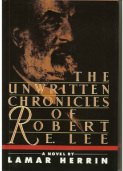
In the 80's I taught a class at Cornell University on 20th Century Southern Fiction. I did some reading on the American Civil War and came across Douglas Freeman's biography of Robert E. Lee, in which Freeman describes Lee as a "wholly human gentleman" (if my memory doesn't fail me). For a novelist no one is a wholly human anything. It's not that we all have our dark sides, but we do have other sides, contain other selves, and there are always rifts. With some historical reason to do so, I imagined Stonewall Jackson as Lee's other side, and the novel took off from there.
"Historical fiction at its best, this psychological study of the two great southern Civil War leaders--Stonewall Jackson and Robert E. Lee--enriches understanding of American history." Library Journal
"Short, audacious, and quite remarkable." American Heritage
"A fine achievement. . .Lamar Herrin picks the lock of Robert E. Lee's heart, and he opens it as a means of measuring not just General Lee's life but ours as well." The Atlanta Journal-Constitution
"A work of great imagination and care, unburdened by the usual conventions. Everything is here, the weather, the soil, the light--one can hear the tinny clatter of pots and pans as vanished men march into the legendary." James Salter
"Historical fiction at its best, this psychological study of the two great southern Civil War leaders--Stonewall Jackson and Robert E. Lee--enriches understanding of American history." Library Journal
"Short, audacious, and quite remarkable." American Heritage
"A fine achievement. . .Lamar Herrin picks the lock of Robert E. Lee's heart, and he opens it as a means of measuring not just General Lee's life but ours as well." The Atlanta Journal-Constitution
"A work of great imagination and care, unburdened by the usual conventions. Everything is here, the weather, the soil, the light--one can hear the tinny clatter of pots and pans as vanished men march into the legendary." James Salter
THE LIES BOYS TELL
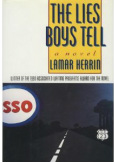
The night before my father died, he told me that if it was going to be a
bother he'd prefer that we not travel three hundred miles to bury him in
the town in which he was born. His humility was such that I was moved to tears, and that night a novel came to me about a man who wanted not to be buried in the town in which he was born but, yes, to die in the very house
and in the very bed in which he was born. The next morning I told my father
I was going to write a novel for the two of us, and The Lies Boys Tell is the result.
"Lamar Herrin's fourth and best novel. . .is a work of unusual lyrical and moral beauty, of challenging metaphorical complexity." New York Times Book Review
"Lamar Herrin's The Lies Boys Tell is an odyssey of loss, a novel about a father and son's attempts to recapture their identities and roles in the confusion of modern life. . .It offers insight and fresh vision, beautifully drawn." San Francisco Chronicle
"More than any book I know, this novel compresses the life and spirit of my age, here in a country we've inherited from both our lost selves and our dying parents. Herrin places us eloquently and intimately into history. His book will move you, and you will celebrate the way it is made." Bob Shacochis
"This is Lamar Herrin's finest novel, a pungent, tense, honest examination of death and love as grownups must learn them: a harrowing and healing book." Frederick Busch
bother he'd prefer that we not travel three hundred miles to bury him in
the town in which he was born. His humility was such that I was moved to tears, and that night a novel came to me about a man who wanted not to be buried in the town in which he was born but, yes, to die in the very house
and in the very bed in which he was born. The next morning I told my father
I was going to write a novel for the two of us, and The Lies Boys Tell is the result.
"Lamar Herrin's fourth and best novel. . .is a work of unusual lyrical and moral beauty, of challenging metaphorical complexity." New York Times Book Review
"Lamar Herrin's The Lies Boys Tell is an odyssey of loss, a novel about a father and son's attempts to recapture their identities and roles in the confusion of modern life. . .It offers insight and fresh vision, beautifully drawn." San Francisco Chronicle
"More than any book I know, this novel compresses the life and spirit of my age, here in a country we've inherited from both our lost selves and our dying parents. Herrin places us eloquently and intimately into history. His book will move you, and you will celebrate the way it is made." Bob Shacochis
"This is Lamar Herrin's finest novel, a pungent, tense, honest examination of death and love as grownups must learn them: a harrowing and healing book." Frederick Busch
HOUSE OF THE DEAF
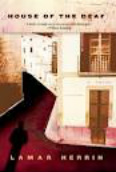
On two occasions, I directed Cornell University's Junior Year Abroad program in Spain. A year after the last of those stints (somewhere in the mid 90's), an American jogging around a small park in Madrid was killed by a car bomb that the separatist Basque organization known as ETA had set off before a Civil Guard headquarters. I myself had jogged around that park, and so had many of my students, and I began to wonder how a program director would deal with the death of a student under those circumstances. My attention quickly shifted to the dead student's father, trying to come to terms with what had happened, and to his other daughter, deprived now of both a sister and a father. At that point House of the Deaf was born.
"Engrossing." St Louis Post Dispatch
"Wrenching." Booklist
"Hypnotic." The Cleveland Plain Dealer
"House of the Deaf is a powerful, poetic, and suspenseful book." Lorrie Moore
"A finely wrought novel of near-mystical dimension." William Kennedy
"With a depth of characterization and a delicacy of observation recalling James Salter, Lamar Herrin takes the reader along on history-haunted Ben Williamson's pilgrimage to Spain. House of the Deaf locates the often painful place where, against our will, the personal becomes political." Stewart O'Nan
"Engrossing." St Louis Post Dispatch
"Wrenching." Booklist
"Hypnotic." The Cleveland Plain Dealer
"House of the Deaf is a powerful, poetic, and suspenseful book." Lorrie Moore
"A finely wrought novel of near-mystical dimension." William Kennedy
"With a depth of characterization and a delicacy of observation recalling James Salter, Lamar Herrin takes the reader along on history-haunted Ben Williamson's pilgrimage to Spain. House of the Deaf locates the often painful place where, against our will, the personal becomes political." Stewart O'Nan
ROMANCING SPAIN, A MEMOIR
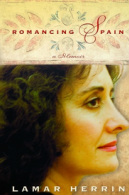
I had always wanted to write the story of how I met my wife in Franco's Spain in December of 1969, and after a year of fighting both the Catholic Church (I had had a brief marriage in the US) and Franco's government, how we made it to the altar. Being a novelist I assumed I would treat the material as fiction. But in 1999 my wife (by then of twenty-nine years) and I decided to travel all the regions of Spain in search of "the perfect pueblo." I am an early riser and my wife a late sleeper. In those approximately three hours of waiting for her to get ready to go pueblo-viewing, I began to write what turned out to be both a story of our marriage in 1970 and of the very quest (admittedly quixotic) we were embarked on in 1999. It all became Romancing Spain.
"Lamar Herrin tells two stories, intertwined and layered. First is the story of the author and his wife, 30 years into marriage, returning to the wife's native country to find a pueblo where they could retire…. The descriptions of the landscapes, the old women holding the keys to the rural churches, of the hotels and the meals, are gorgeous, loving and rich….The book's second story, and its real thrust, is the author's story of how he arrived in Franco's Spain in the 1960s, a disgruntled, newly divorced American looking to discover Europe. Instead, he met a young woman, fell in love and married….Utterly romantic….In a world of memoirs describing tragic childhoods and miserable lives, Herrin's book takes the reader on a very different, very pleasant journey.” The San Francisco Chronicle
"[D]elivers an amusing, perceptive treatment of the culture... in a land where Americans engender both awe and suspicion. Readers... will find moments of lyrical beauty and genuine sweetness, especially his finely wrought observations of Spain's plazas and vistas. Suffused with a palpable sense of wonder, the travelogue ... double(s) as a valentine to his wife." Publishers Weekly
“[An] extraordinary love story…Herrin has plotted this book like a suspenseful novel. It succeeds as a unique love story and as an evocation of Spain: its sweeping plateaus and fragrant orange orchards, its great regional foods and attentive formalities.” The Louisville Courier-Journal
“Which did I fall in love with first, the woman or the country?” This is Herrin’s refrain in this memoir-cum-travelogue, which reads like a love letter both to his wife of 30 years, Amparo, and to Spain, her native country…The culture clash between the recently divorced, Kentucky-born Protestant and the overprotected, moody Catholic is eloquently and often humorously rendered…Meanwhile the couple’s quest to find the ideal retirement village is described in luminous detail, with much instructive commentary on architecture and food and drink. A lovely book that will appeal to both romantics and travelers.” Booklist
"Lamar Herrin tells two stories, intertwined and layered. First is the story of the author and his wife, 30 years into marriage, returning to the wife's native country to find a pueblo where they could retire…. The descriptions of the landscapes, the old women holding the keys to the rural churches, of the hotels and the meals, are gorgeous, loving and rich….The book's second story, and its real thrust, is the author's story of how he arrived in Franco's Spain in the 1960s, a disgruntled, newly divorced American looking to discover Europe. Instead, he met a young woman, fell in love and married….Utterly romantic….In a world of memoirs describing tragic childhoods and miserable lives, Herrin's book takes the reader on a very different, very pleasant journey.” The San Francisco Chronicle
"[D]elivers an amusing, perceptive treatment of the culture... in a land where Americans engender both awe and suspicion. Readers... will find moments of lyrical beauty and genuine sweetness, especially his finely wrought observations of Spain's plazas and vistas. Suffused with a palpable sense of wonder, the travelogue ... double(s) as a valentine to his wife." Publishers Weekly
“[An] extraordinary love story…Herrin has plotted this book like a suspenseful novel. It succeeds as a unique love story and as an evocation of Spain: its sweeping plateaus and fragrant orange orchards, its great regional foods and attentive formalities.” The Louisville Courier-Journal
“Which did I fall in love with first, the woman or the country?” This is Herrin’s refrain in this memoir-cum-travelogue, which reads like a love letter both to his wife of 30 years, Amparo, and to Spain, her native country…The culture clash between the recently divorced, Kentucky-born Protestant and the overprotected, moody Catholic is eloquently and often humorously rendered…Meanwhile the couple’s quest to find the ideal retirement village is described in luminous detail, with much instructive commentary on architecture and food and drink. A lovely book that will appeal to both romantics and travelers.” Booklist
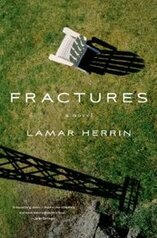
FRACTURES
If novels begin somewhere, with some moment, some image, Fractures might be said to have begun when I stepped into the county courthouse in Montrose, Pennsylvania, and the policeman on duty there told me that the desks lined up and down the main hall had been set out to accommodate the many people who had come in to do title searches once the natural gas drilling boom had hit there. In some cases, family members were vying with family members to see which parcel of land corresponded to whom. I was interested in the family drama; I had no muckraking axe (to conflate tools) to grind. Plus, I was drawn to the image hydrofracking provided: down (perhaps a mile) and horizontally out (perhaps another mile). Plumb your depths and then swing wide. Compulsory integration. It became a complex, nearly all-encompassing metaphor that spoke to my imagination and allowed me to create a novel with eight point of view characters (one of whom is an ex-roughneck become landman from Texas) attempting to achieve common cause.
“Here’s an environmental novel that does just what you want it to do: Frame an important contemporary debate in profoundly human terms... Fractures is uncommonly thoughtful about many issues, starting, of course, with the externalities of our energy needs and the costs of American ambition... Plenty of readers will enjoy Herrin’s book for its lustrous writing and poignant insight into the challenge of building a life worth living. But if you also want a novel that addresses a pressing political and environmental issue, Fractures is worth exploring.” Washington Post
“Lamar Herrin mines the fracking metaphor for all its worth, portraying a family’s battle over whether to lease their natural-gas-rich land with a lyricism as incisive as it is graceful...[Herrin’s] emphasis on complex structures over individual psychology offers unique insights into the nature of conflict, whether personal or political. It is an insight that may leave you full of hope or despair, depending on how you feel, not about fracking, but about family.” Chicago Tribune
“Herrin’s deeply contemplative examination of this contentious topic is less about the environmental fallout from an invasive destruction of the land and more about the emotional fragility of a family who feels all too deeply the loss of a way of life.” Booklist, Starred Review
“Herrin has long been drawn to morally complex situations (House of the Deaf; The Lies Boys Tell), and he examines another one here with great sympathy, psychological insight, and intelligence. What is so endearing about this book is that even under intense pressure, the members of this clan retain their decency and humanity. There is tragedy here, but there are also inspiring moments of compassion and kindness. A deeply moving novel that is highly recommended for fans of literary fiction.” Library Journal
“Novelist, memoirist and short story writer Herrin…has managed to transform the high profile, politically divisive issue of fracking into a thoroughly human, moving family drama…. While fracking is a foregone conclusion in this beautifully crafted novel, the riveting drama lies in the buried emotions that are unearthed for better and worse.” Kirkus Reviews
"Lamar Herrin's Fractures is a brilliantly conceived and executed novel that illustrates how coping with familial dysfunctions can help us understand and deal with the more deadly dysfunctions of society. Here's one of my favorite writers at his finest." Ron Hansen, author of The Assassination of Jesse James
“With a voice as clear and kind as William Maxwell’s, and an acuity of vision as penetrating as J. M. Coetzee’s, Lamar Herrin has produced a devastating novel about family, home, and the dangers of plundering the earth. Peopled with characters as real as anyone we know and love, Fractures is a chronicle of our time, one that thrusts to light the dark attraction of technological pioneerism even as it traces the forces that divide and unite us all. I stand in awe of Herrin’s enormous talent and depth of heart.” Julie Orringer, author of The Invisible Bridge and How to Breathe Underwater
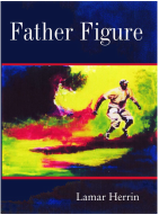
FATHER FIGURE
Most novelists have a story or two they’d like to expand into a novel, one day planning to get around to it. Many, of course, don’t get around to it, the urge dies or they do and the novel remains a story. Father Figure had as its genesis a story I published in Epoch magazine in 1998, “Casualties.” That was a story about a man who returned from World War II, minus his left leg and his generous, trusting nature. Before the war, he had been a hero to his town and returned to it to find that during the time he’d been abroad in the service his wife had given birth to a son. The son, of course, never knew his pre-war father (about whom adoring stories were told), only the powerfully driven and deeply embittered one-legged man who’d survived the Battle of the Bulge. The story, I came to understand, belonged ultimately to the son and to the people (family members and townspeople alike) around him, and almost twenty years later Father Figure was born.
"What a remarkable, evocative book. Lamar Herrin is a consummate story-teller, and Father Figure is a richly imagined American story - of patrimony and baseball and war and the inheritance of history's wounds - told with great physical immediacy and a seemingly effortless emotional intensity."
- Philip Gourevitch, author of The Ballad of Abu Ghraib
Most novelists have a story or two they’d like to expand into a novel, one day planning to get around to it. Many, of course, don’t get around to it, the urge dies or they do and the novel remains a story. Father Figure had as its genesis a story I published in Epoch magazine in 1998, “Casualties.” That was a story about a man who returned from World War II, minus his left leg and his generous, trusting nature. Before the war, he had been a hero to his town and returned to it to find that during the time he’d been abroad in the service his wife had given birth to a son. The son, of course, never knew his pre-war father (about whom adoring stories were told), only the powerfully driven and deeply embittered one-legged man who’d survived the Battle of the Bulge. The story, I came to understand, belonged ultimately to the son and to the people (family members and townspeople alike) around him, and almost twenty years later Father Figure was born.
"What a remarkable, evocative book. Lamar Herrin is a consummate story-teller, and Father Figure is a richly imagined American story - of patrimony and baseball and war and the inheritance of history's wounds - told with great physical immediacy and a seemingly effortless emotional intensity."
- Philip Gourevitch, author of The Ballad of Abu Ghraib
